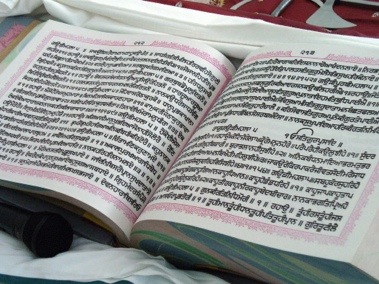Chandigarh/ Punjab (May 14, 2014): As per information available with the Sikh Siyasat News (SSN), a four-day ‘Gurbaani Impact Study Programme’ concluded at Panjab University (PU), Chandigarh Campus.
This programme was organized under the Major Project sanctioned by the University Grants Commission with Prof. Jaspal Kaur Kaang, Chairperson of Department of Guru Nanak Sikh Studies, PU as its Principal Investigator.
The main objective of the Project was to establish that teachings enshrined in the Sikh scripture Guru Granth Sahib Ji can play a very significant role in treating ailments and solving all the other problems being faced by human beings in the modern age at the personal, social and global levels.
As many as 150 participants attended the program regularly on all the four days. The participants, male and female, included people from all walks of life and different age groups. At the Valedictory Function Prof. Kaang thanked S. Hardial Singh and his team, all the participants and volunteers, PU and U.G.C authorities and the Gurdwara Management for their association with the programme. She hoped that the achievements made through this
programme will go a long way in making the U.G.C Project a highly successful and fruitful venture.
The programme was held at the Gurdwara Sahib of Sector 14, Chandigarh in collaboration with ‘Sarb Rog Ka Aukhad Naam Mission’, Chandigarh with S. Hardial Singh, a former I.A.S officer as its Head.
The mission has been active for the last three decades and has been organizing camps for healing through Gurbaani, regularly.
The daily programme, was divided into two sessions i.e. 8.30 AM to 11.30 AM and 5 PM to 8 PM.
Each session was devoted to Gurbaani- Keertan led by expert Raagis, Gurbaani Recitation, elaboration of Gurbaani teachings highlighting the healing effect of Gurbaani in diverse ways, Kirtan by Sangat, discourses inspiring adoption of teachings of Gurbaani for moral and spiritual upliftment.
Lively interaction also made part of each session Religious literature was distributed among participants and interviews were held.
Data was collected at the beginning and on the conclusion of the programme to assess the progress made vis-a-vis the impact of the experience gained by the participants.

